Monitoring and analyzing PPC performance is a complex task. With so many variables, nuances, and results to consider, it’s not always easy to get the full picture. And when you’re creating comprehensive reports for clients and execs, it can be even more of a challenge.
ChatGPT and other PPC automation tools can make these tasks easier. But to improve efficiency using AI, you need the right prompts. Basic, vague, or incomplete prompts are unlikely to give genuinely useful output, whether it’s because the AI doesn’t have an accurate picture of your data, or because it doesn’t understand exactly what you want to achieve.
Detailed, well-structured prompts can potentially save you a lot of manual work. Here, you’ll find 10 prompts that PPC experts use to analyze campaign performance effectively.
Why great prompts are essential for PPC analysis
All LLMs rely on good input to generate helpful content. Prompts that are ambiguous, confusing, or lacking in detail will only lead to the most basic (or even incorrect) output, which is unlikely to drive conversions or provide you with useful analysis.
We spoke to Amy Hebdon, founder of Paid Search Magic, about the best strategy for using ChatGPT to help create effective ads:
“It’s a bit of a garbage in, garbage out situation. To write a good ad, you have to have some sort of brief. You have to have a definition of what success looks like, you have to know your audience and anti-audience, you have to define and differentiate your offer — and you have to go through all this work to figure out the key messages you need to communicate. If you know that — and even if ChatGPT helps you arrive at that — you can then ask ChatGPT for help.
But if you’re just like, “Write me an ad,” or even “Here’s my landing page, write me an ad”... what ChatGPT on its own thinks a good ad looks like is pretty bad. It’s pretty generic. So if you want that differentiation, you can’t just say, “Write an ad based on this keyword” because you’ll get the most generic ad possible. You have to say: here are all the factors, and create a brief for it.”
Watch the full discussion here:
While ChatGPT can be a really useful tool, it’s not necessarily a shortcut to inspiring ad copy. You need to make sure it understands what you want to achieve and delivers on that — and it’s the same for reporting and analysis.
Find out more about how to create your own prompts in our 10 ChatGPT prompts for effective PPC planning.
10 effective prompts for PPC reporting and analysis
Great reporting and campaign analysis helps you optimize your PPC results, making your campaigns more cost-efficient and effective. With the right prompts for ChatGPT, you can streamline these processes even further.
Here are 10 of the best prompts for PPC reporting to help you perform better, quicker campaign analysis.
Campaign optimization
Whether you want to create conversion-boosting copy or generate quality product feed info en masse, here are the best ChatGPT prompts for optimizing PPC campaigns.
1. Analyze & optimize your landing pages
Prompt: “What can a person do from this page and why would they want to do it? [Landing page URL]”
(Source: Search Engine Land)
Output:
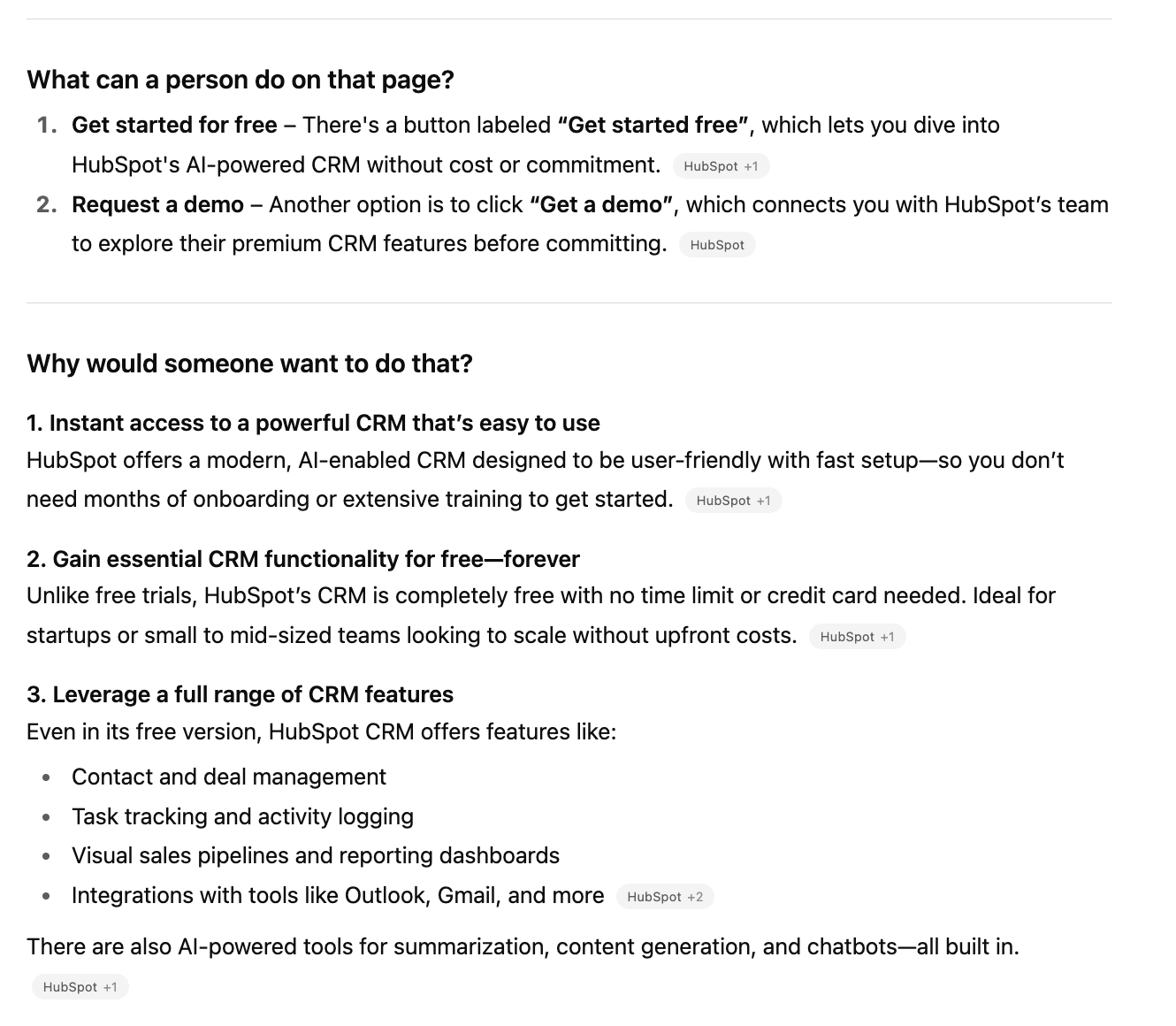
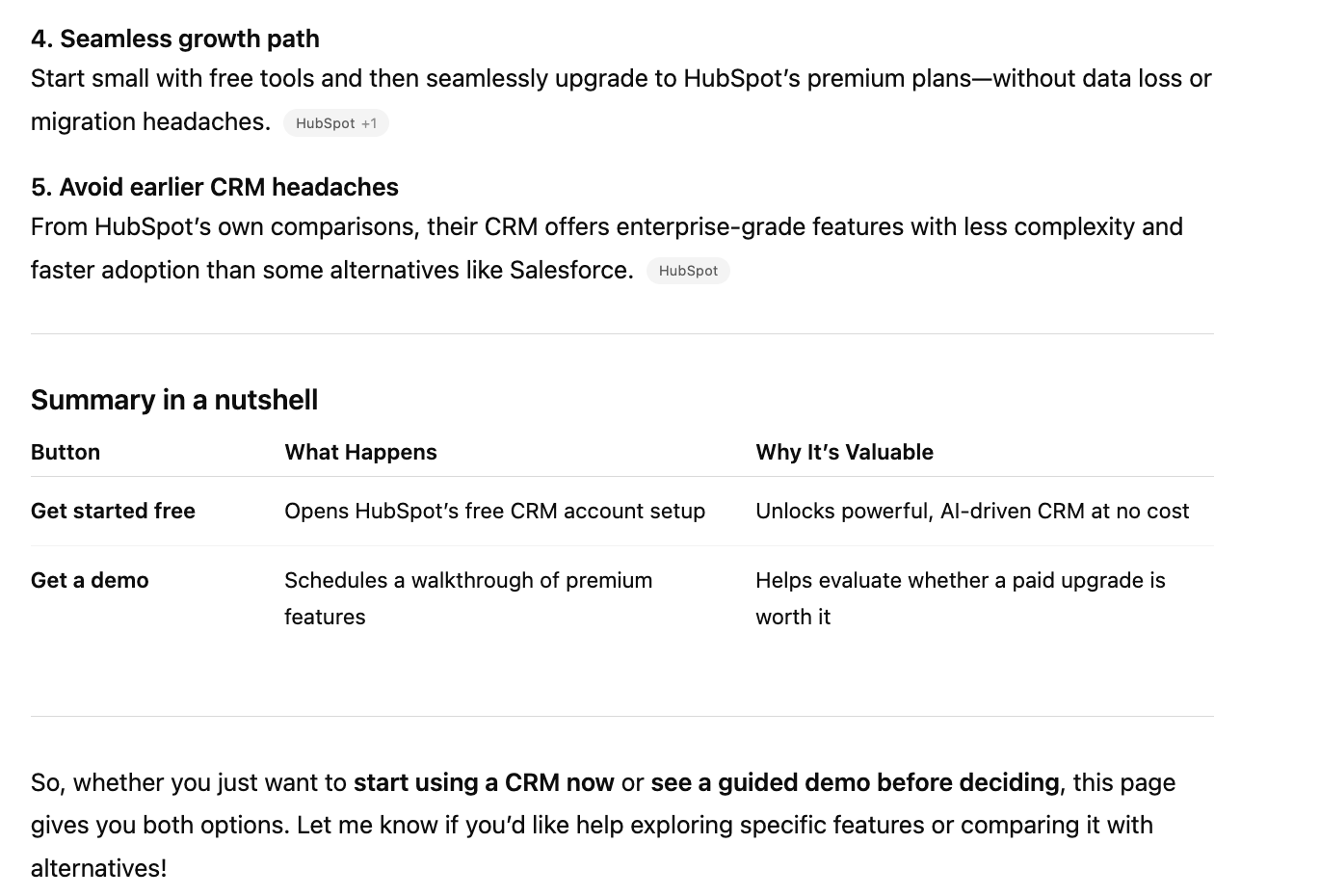
This quick landing page analysis prompt shows how clear and understandable your landing page is. If the GPT output aligns with what you want to achieve via this landing page, you’re golden. If not, test and tweak your landing page until you find effective messaging and design.
You can also use this prompt to analyze competitor landing pages and see how they attract and convert visitors.
2. Shopping Feed optimization
Prompt: “Rewrite the product title to include gender, product type, main feature, and brand. Format as: [Gender] [Product Type] with [Feature] | [Brand].”
(Source: Search Engine Land)
This prompt enables you to optimize your Shopping Feed product titles at scale, giving you consistent, conversion-friendly formatting. Here’s the original product feed input versus the GPT output:

Prompt author Aric Whiteley ran this prompt in Google Sheets using GPT via Apps Script. GPT extensions or plugins can help you streamline your workflow even further, without the need for importing/exporting data.
3. Fix low quality score
Prompt: “Nike’s brand campaign has 14 keywords spending over $1,000/mo with a Quality Score of 3. Suggest hypotheses for low performance and what changes we should consider.”
(Source: Search Engine Land)
Output:
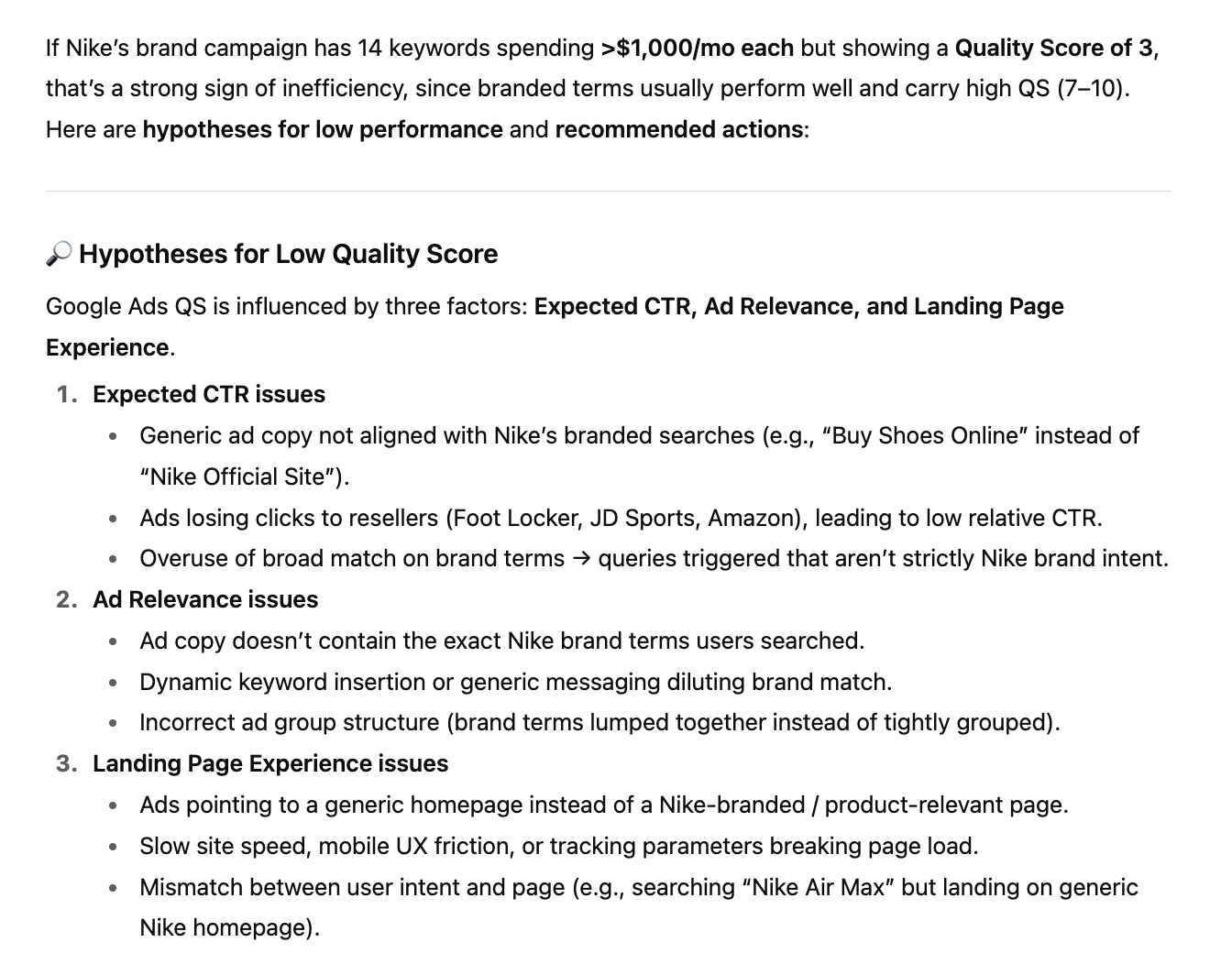
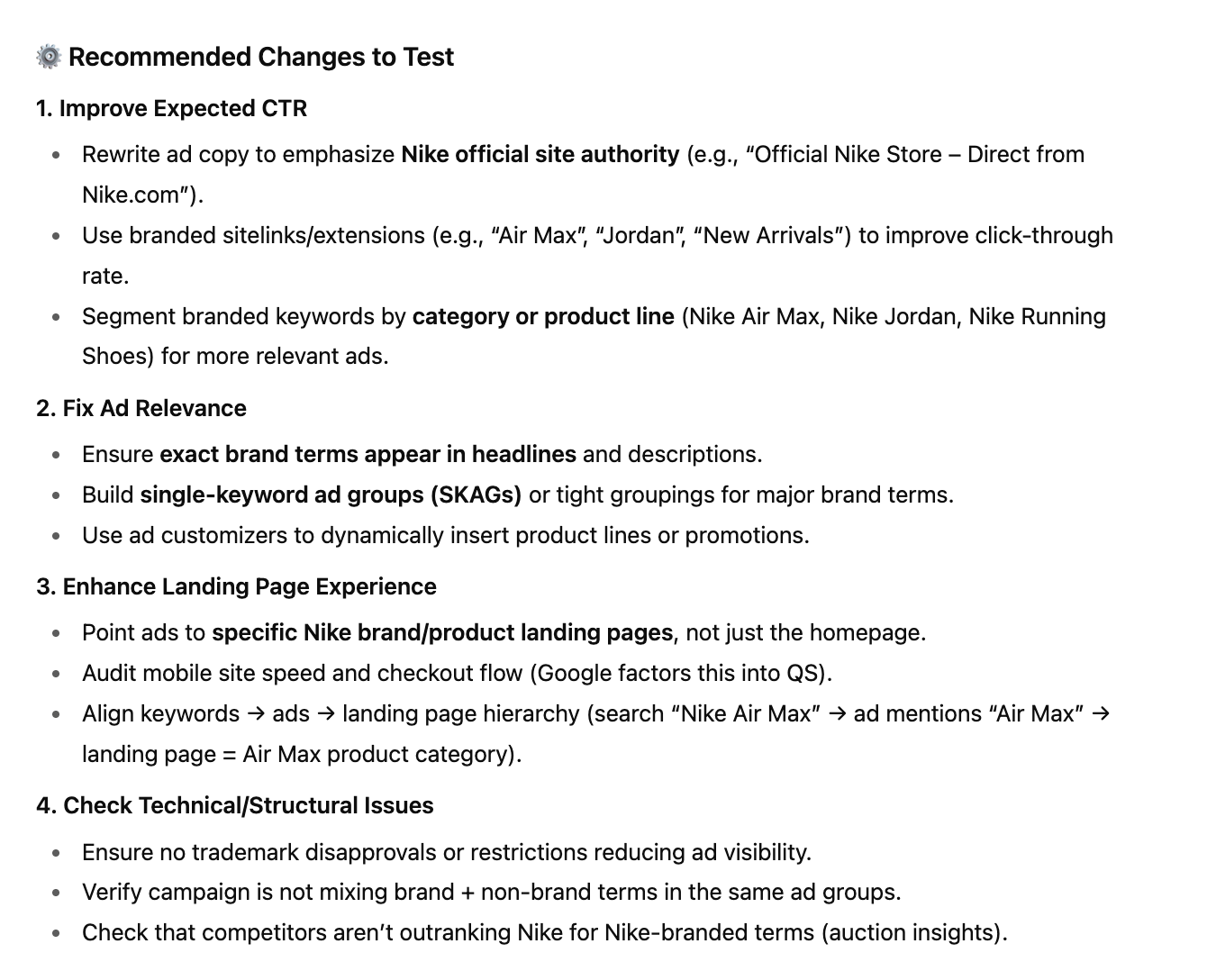
Here, ChatGPT provides a great rundown of theoretical reasons why a brand campaign could be experiencing low quality score. Best of all, it gives clear elements you can check or test to improve your Google Ads quality score.
Investigate performance
PPC performance issues aren’t always clear-cut. If you need to delve deeper into your data to unearth the issues affecting your campaigns, here are some of the best GPT prompts.
4. Analyze performance changes
Prompt: “My conversions from paid traffic are down 20% month over month. What metrics and dimensions should I look at to find the cause?”
(Source: Search Engine Land)
Output:
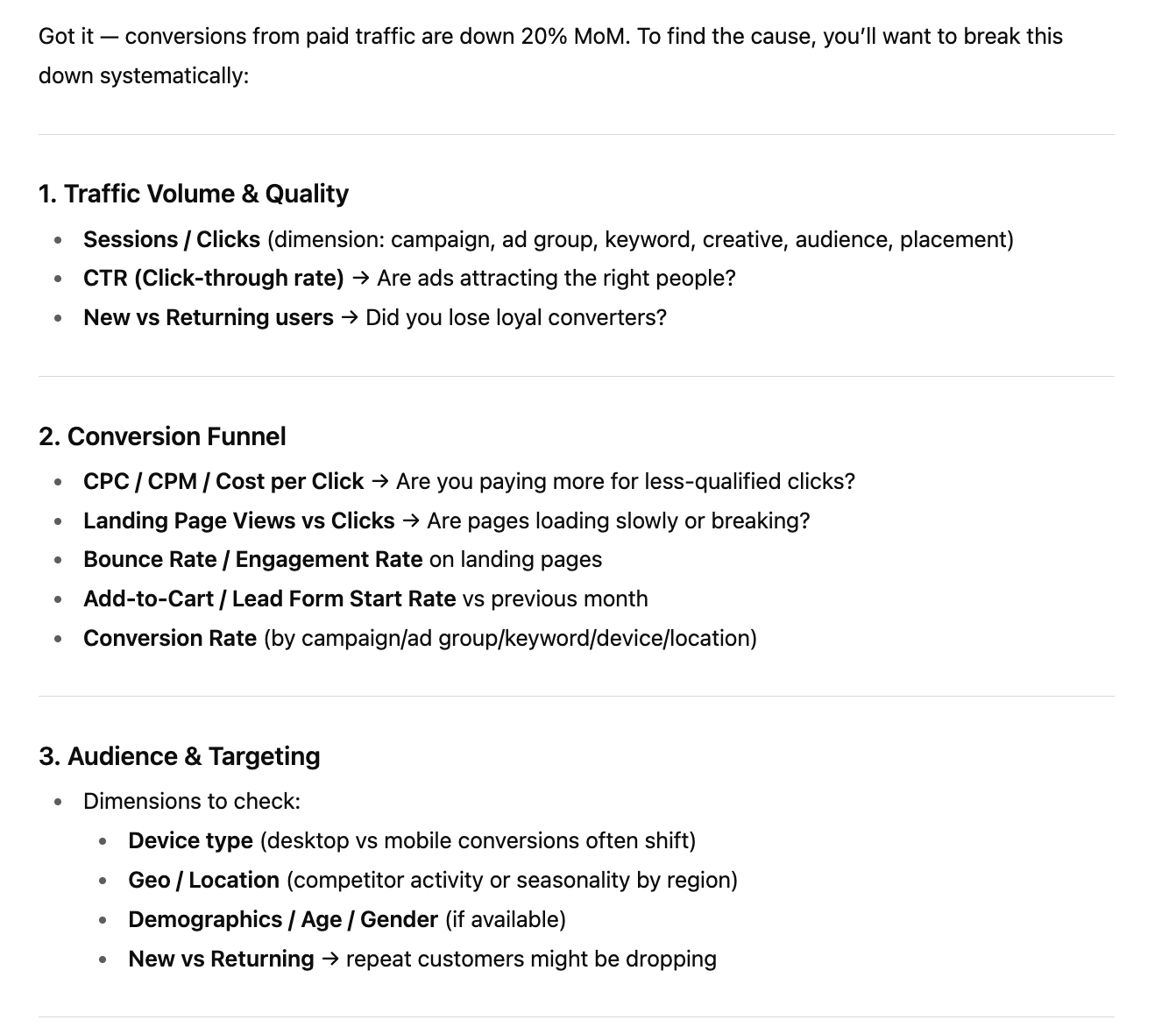
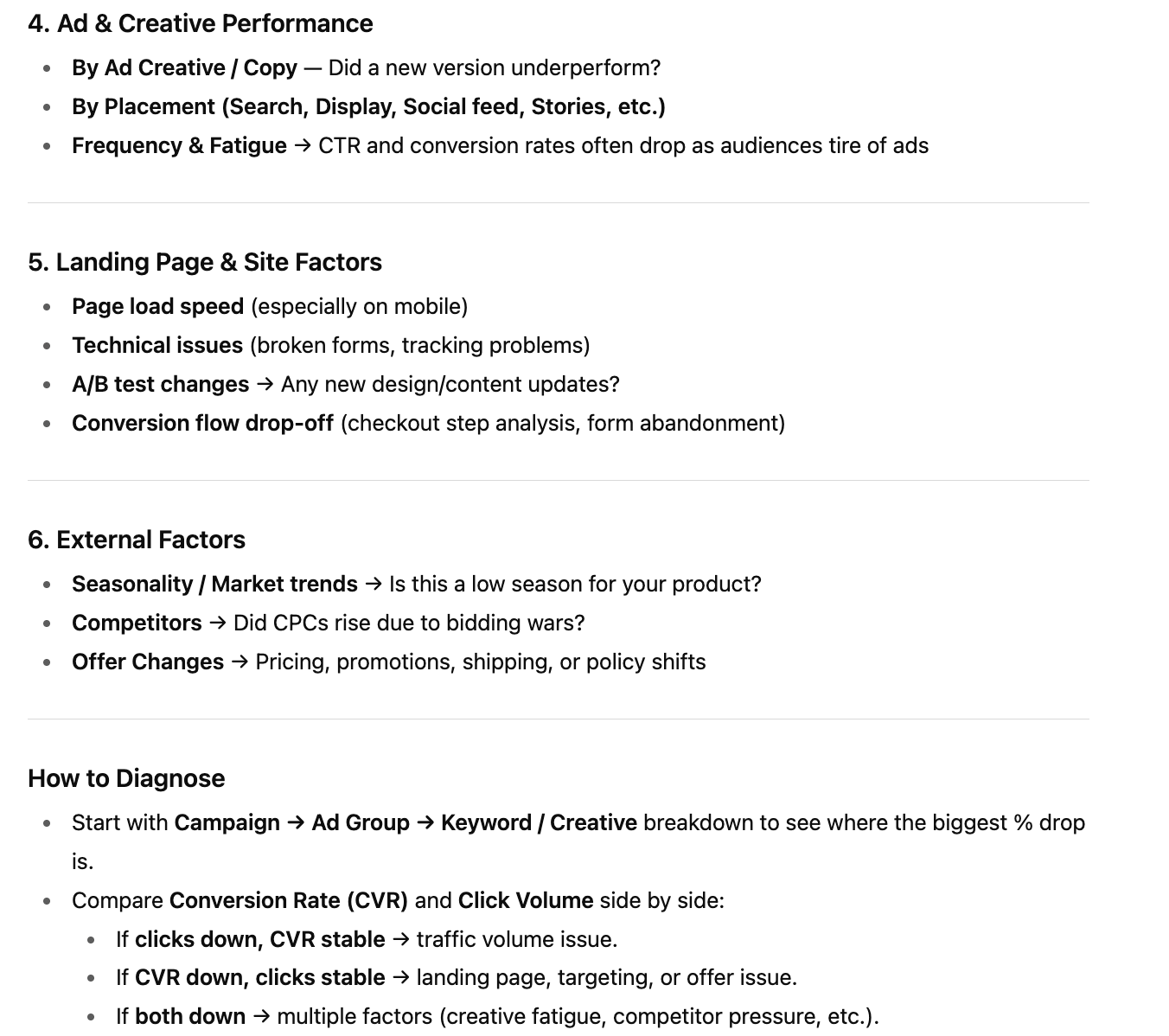
This prompt gives you a good overview of which metrics to check when analyzing a specific performance change. Output may vary depending on whether the change is positive or negative, and how significant the change is.
For more detailed suggestions, add more context to your prompt. For example, if you made any changes to your budget, ad content, or scheduling, ChatGPT can use these contextual clues to refine its suggestions.
5. Challenge your conclusions
Prompt: “I’m going to tell my client that paid search performance is down month over month because of seasonality. How might they respond that would challenge my conclusion?”
(Source: Search Engine Land)
Output:
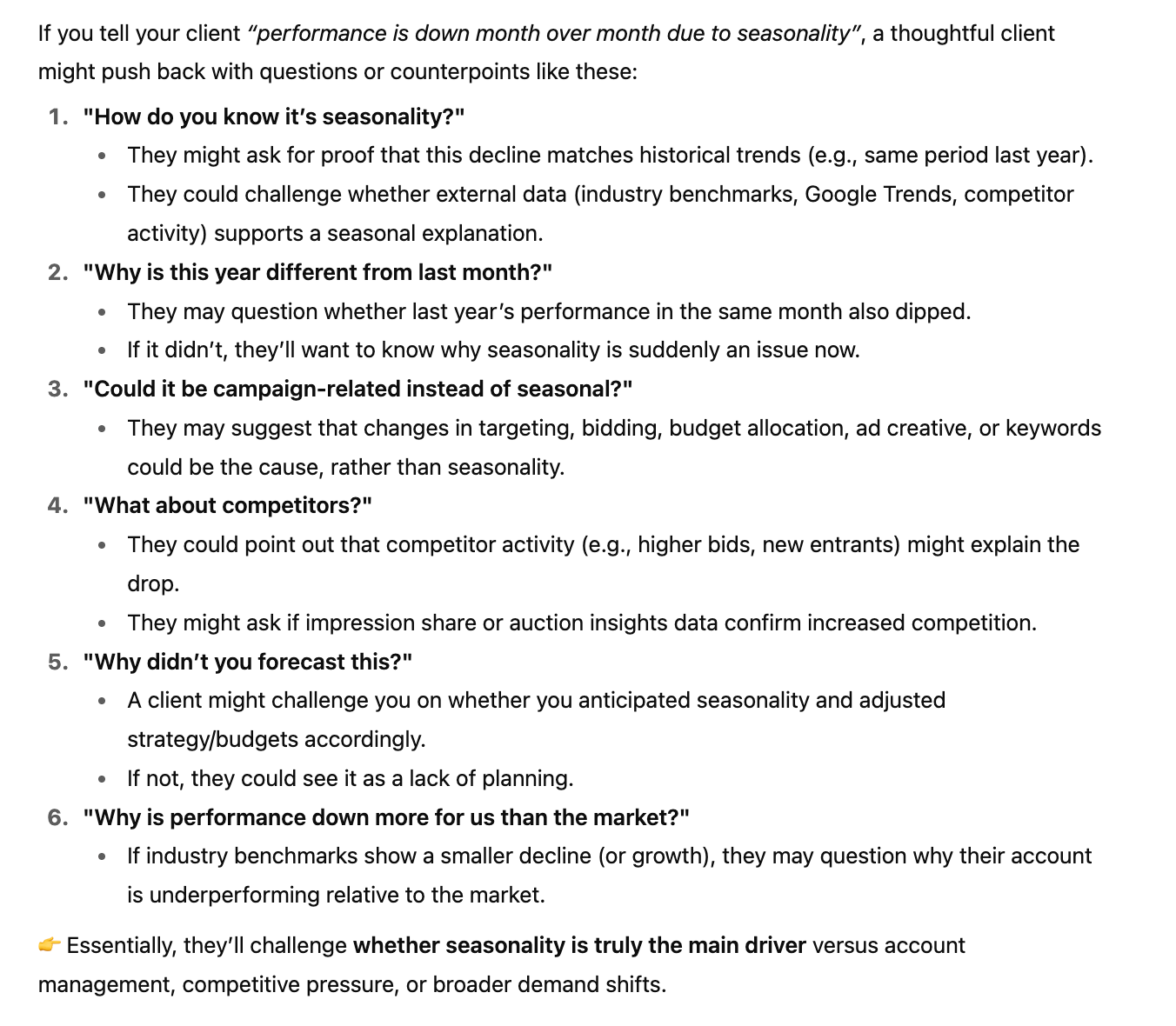
Clients or managers are likely to challenge your assumptions, so use ChatGPT to get ahead of the game. Find out what questions you might be asked in response to your data analysis, so you can a) provide the answers and b) double check your work.
6. Audit your PMax search terms
Prompt: “You are auditing Nike’s Performance Max search terms. Group the following into themes like competitor traffic, job searches, or unqualified queries. Return a summary and examples.”
(Source: Search Engine Land)
Output (based on hypothetical search terms generated by ChatGPT):
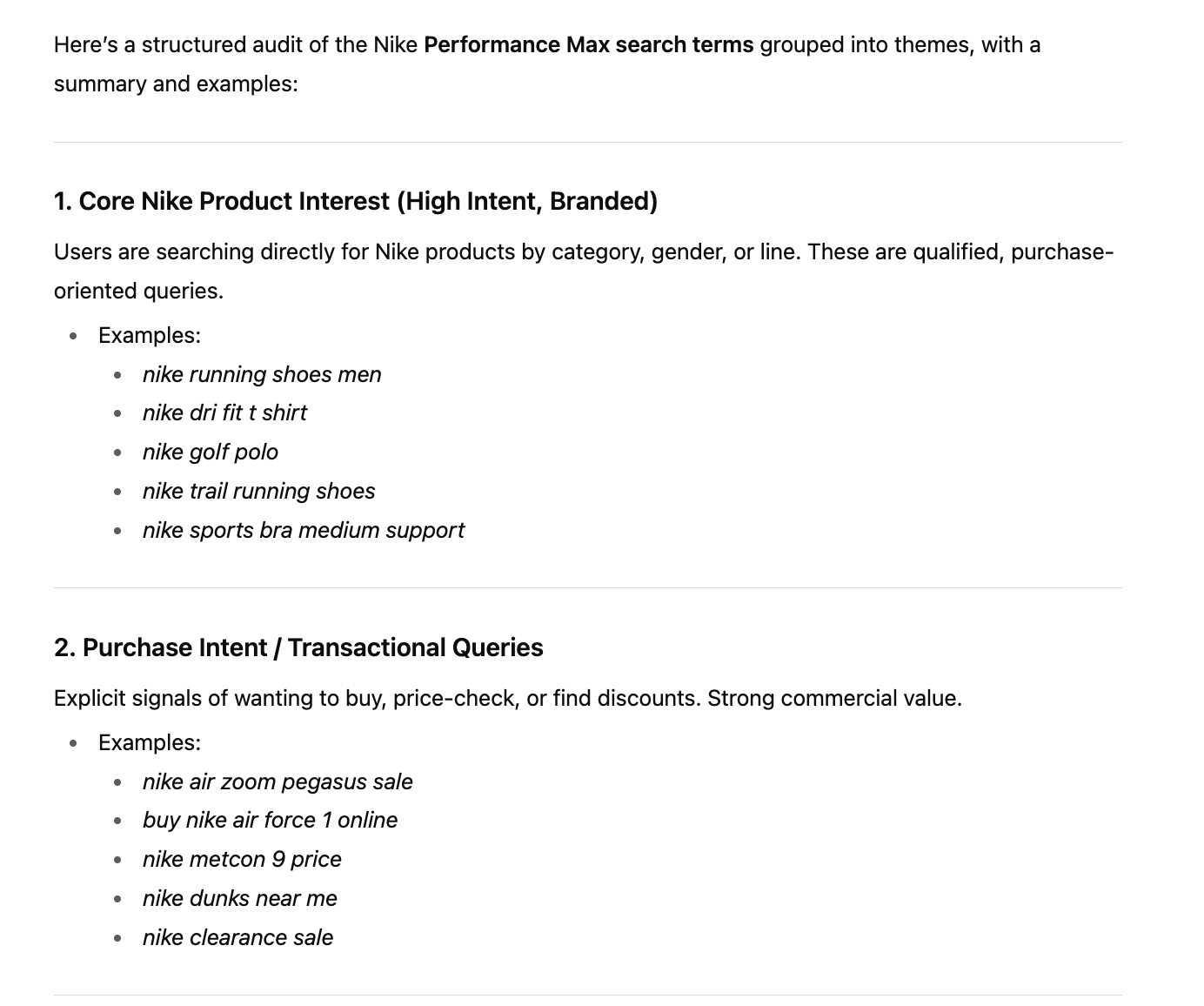
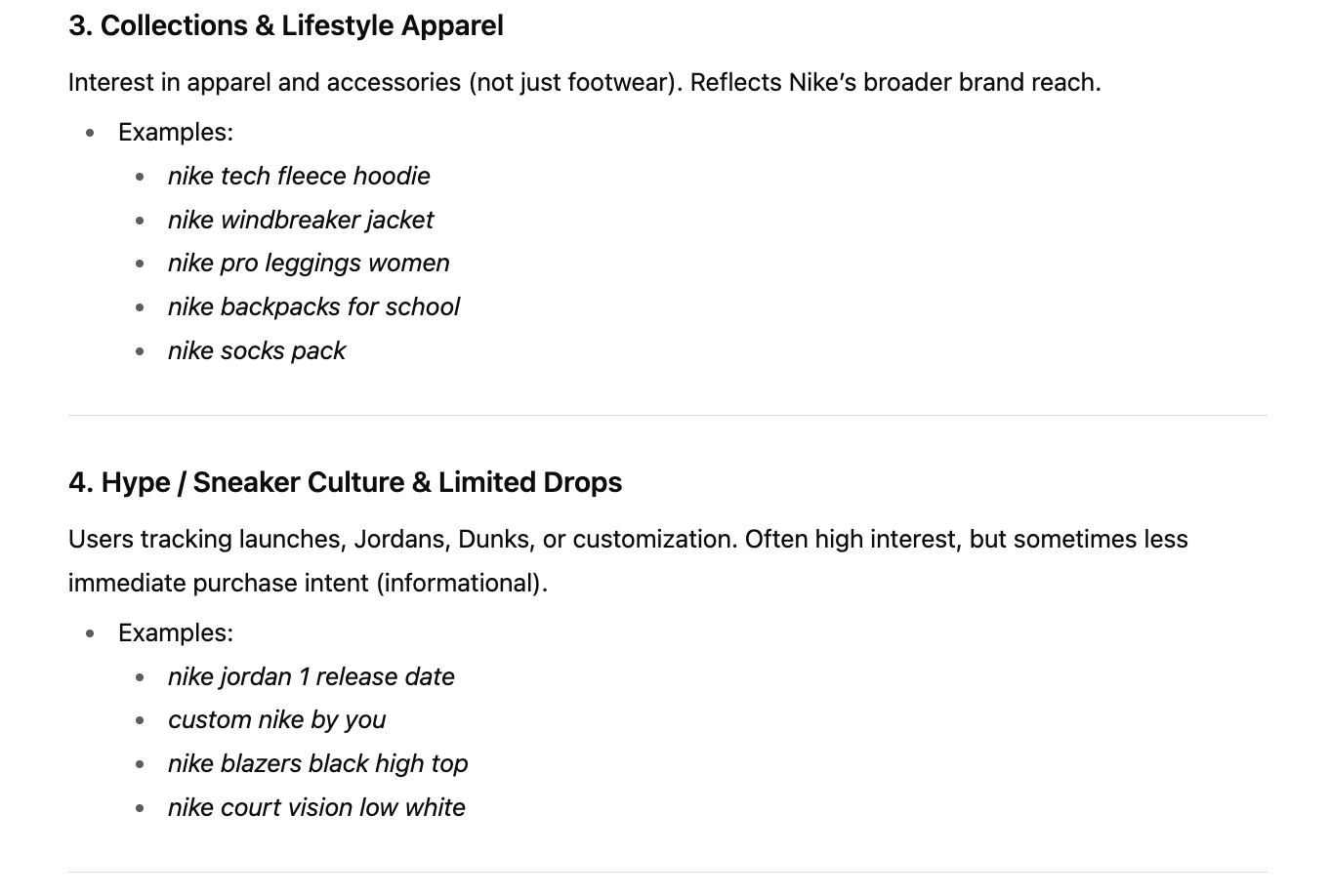
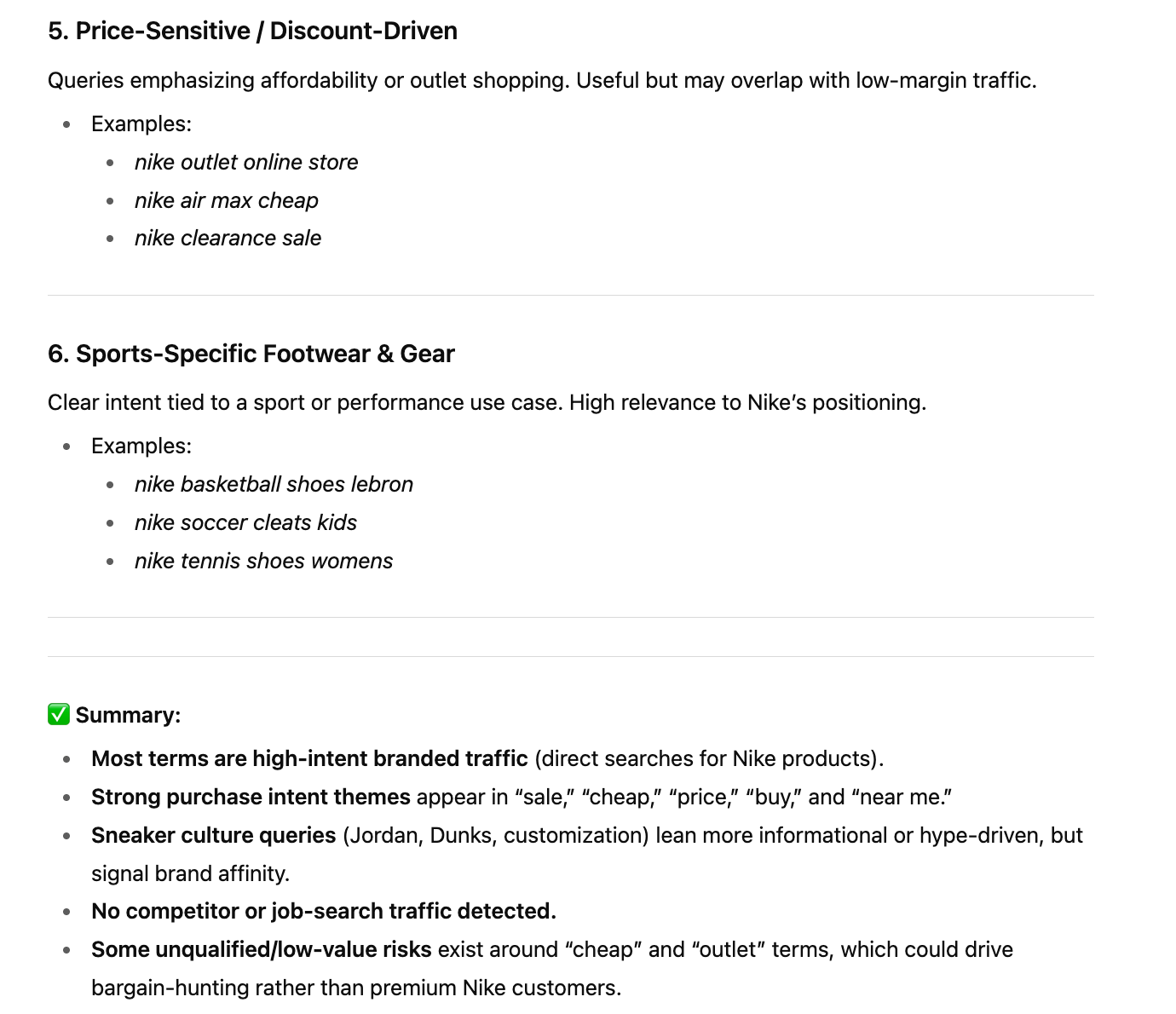
Organizing search terms thematically helps you better understand how users are finding your brand, and learn exactly what they’re searching for. Use this data to refine campaigns (especially in Performance Max, where certain campaign controls are limited). Update negative keywords, improve existing targeting, and set up new campaigns or ad groups for new or previously unexplored themes.
Write up reports
ChatGPT can help you create reports based on your data. Whether you want charts and graphs or text-based summaries, here are some of the best prompts for PPC report creation.
7. Summarize experiment results
Prompt: “You are documenting a channel experiment where you tested the hypothesis that by [testing X] will achieve [desired outcome]. These were the results: [insert test results]. Write me an Experiment Summary answering the question, “What are the big takeaways from this experiment?”
(Source: Search Engine Land)
Output (with example prompt):
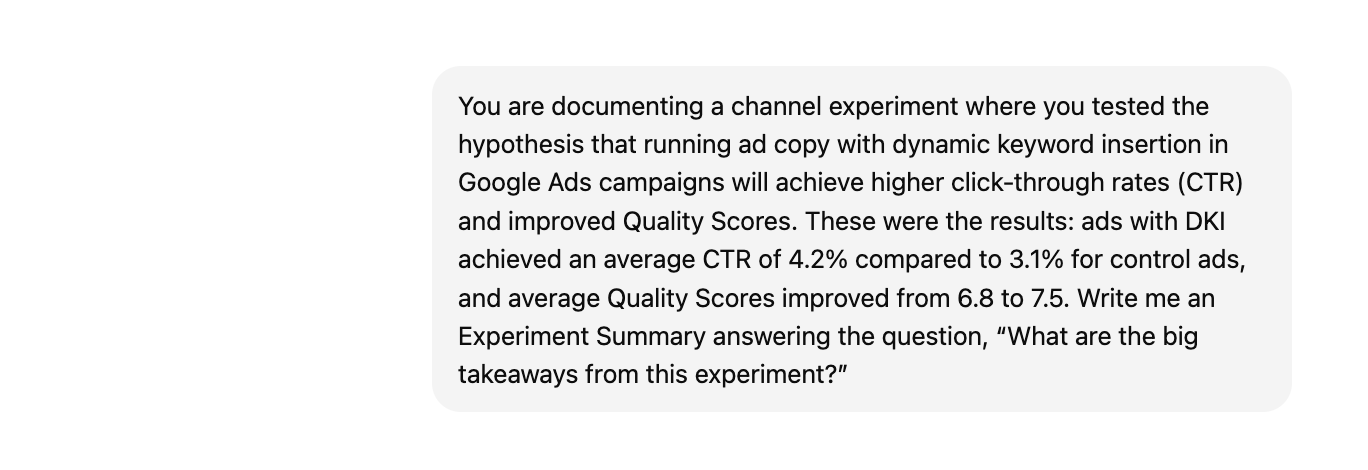
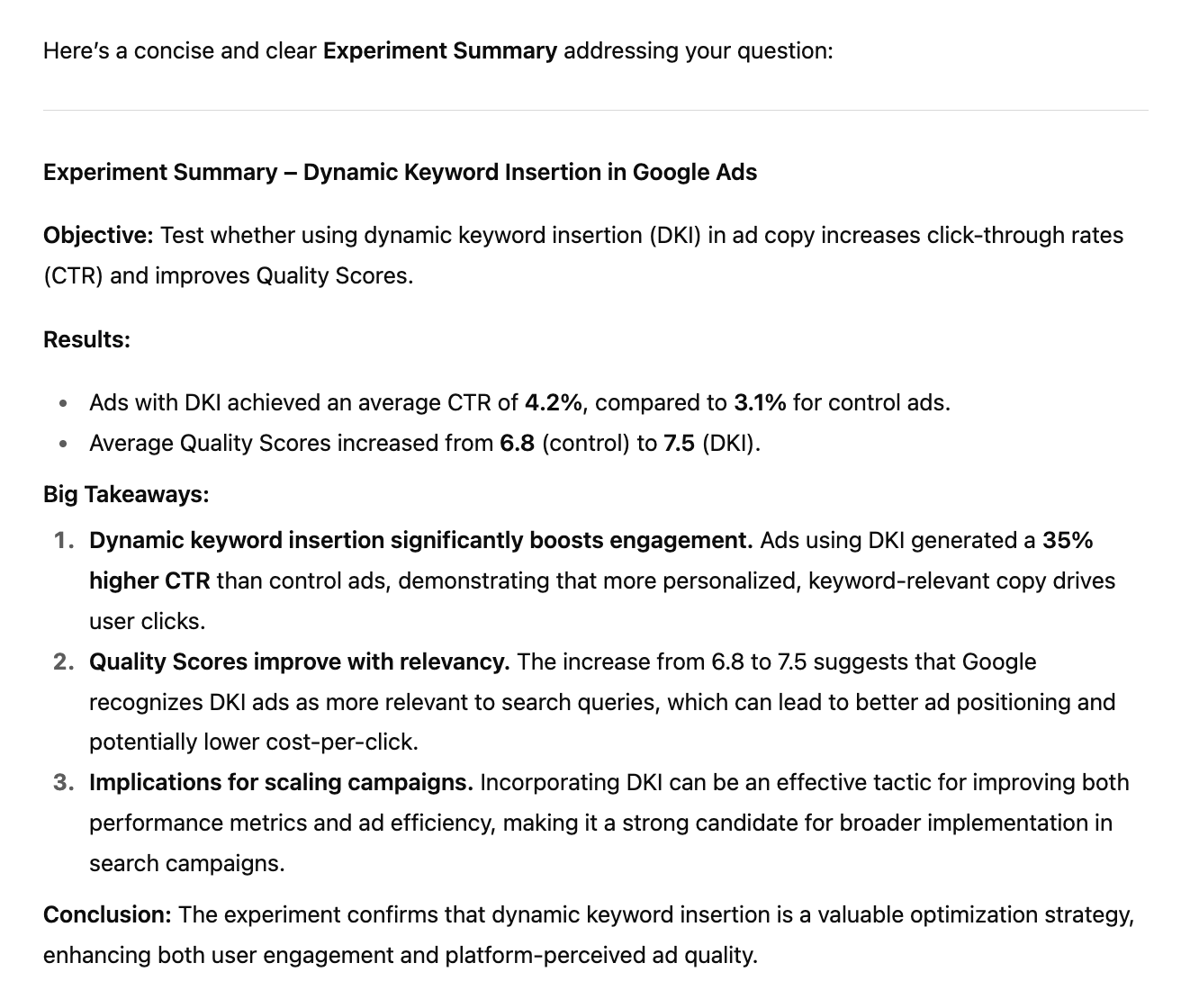
Test results can be complex, so asking ChatGPT for a high-level overview of the results can help you clarify them in your mind and to other people. This can bolster support for making changes to your campaigns — for example, requesting or reallocating budget and using alternative features.
8. Compile report highlights
Prompt: “Analyze the data with 3 key bullet points to share with executives in a succinct email format. Use numbers.”
(Source: Local Search founder & president Jim Flint, via Search Engine Land)
This prompt helps you compile report highlights, giving C-suite execs an overview of what to expect in the full report. This can help you save time after you’ve done most of the legwork, as you won’t need to manually summarize your findings.
This prompt needs to be used alongside a comprehensive dataset to get the best results. Paste this into ChatGPT so it knows exactly what data you want to analyze.
9. Explain like I’m five
Prompt: “Act like a PPC expert and explain ‘impression share lost’ to me like I’m five years old.”
(Source: Michelle Kop)
Output:
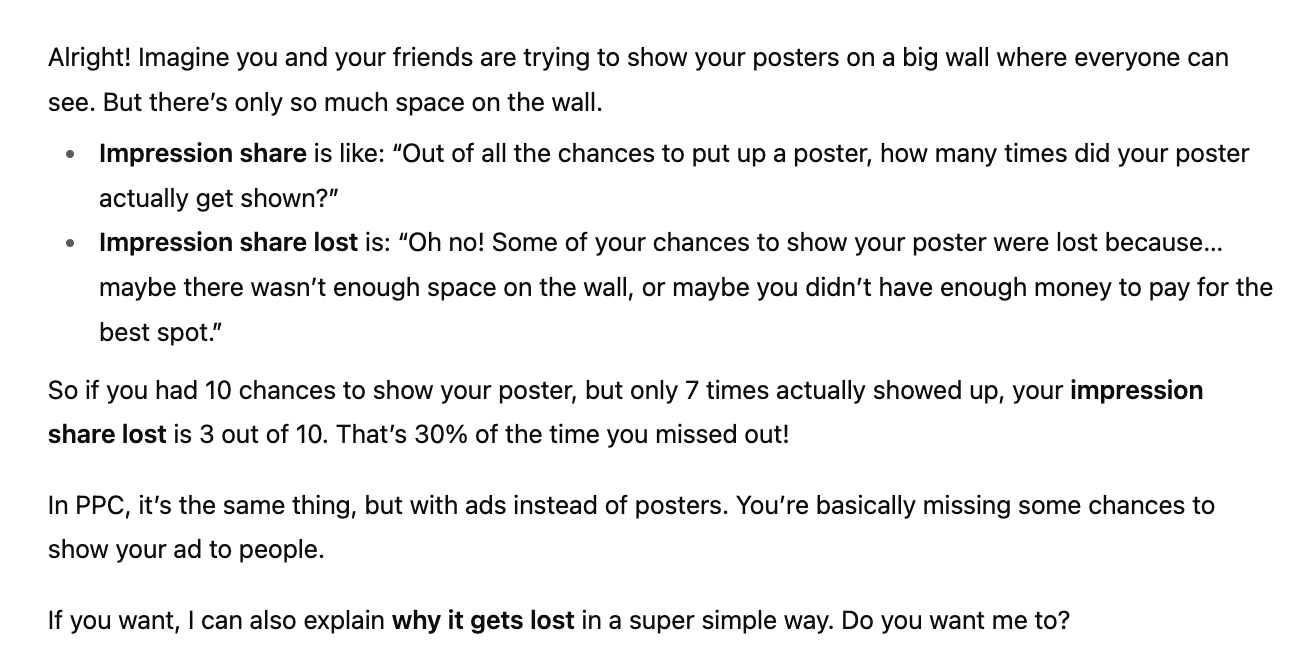
If you’re sharing data with non-PPC experts — or just trying to get a better understanding of complex topics yourself — an ‘explain like I’m five’ prompt can be really helpful. If you are sharing the output with others, though, make sure the analogies aren’t so simple that they come off as patronizing. Ask ChatGPT to explain it differently or use a more appropriate description.
10. Generate Excel formulas
Prompt: “Column A in Excel has a list of names and column B has another list of names. I would like an Excel formula to scan column A and column B to see which names appear in both columns. Can you provide a formula for that?”
(Source: Michelle Kop)
Output:
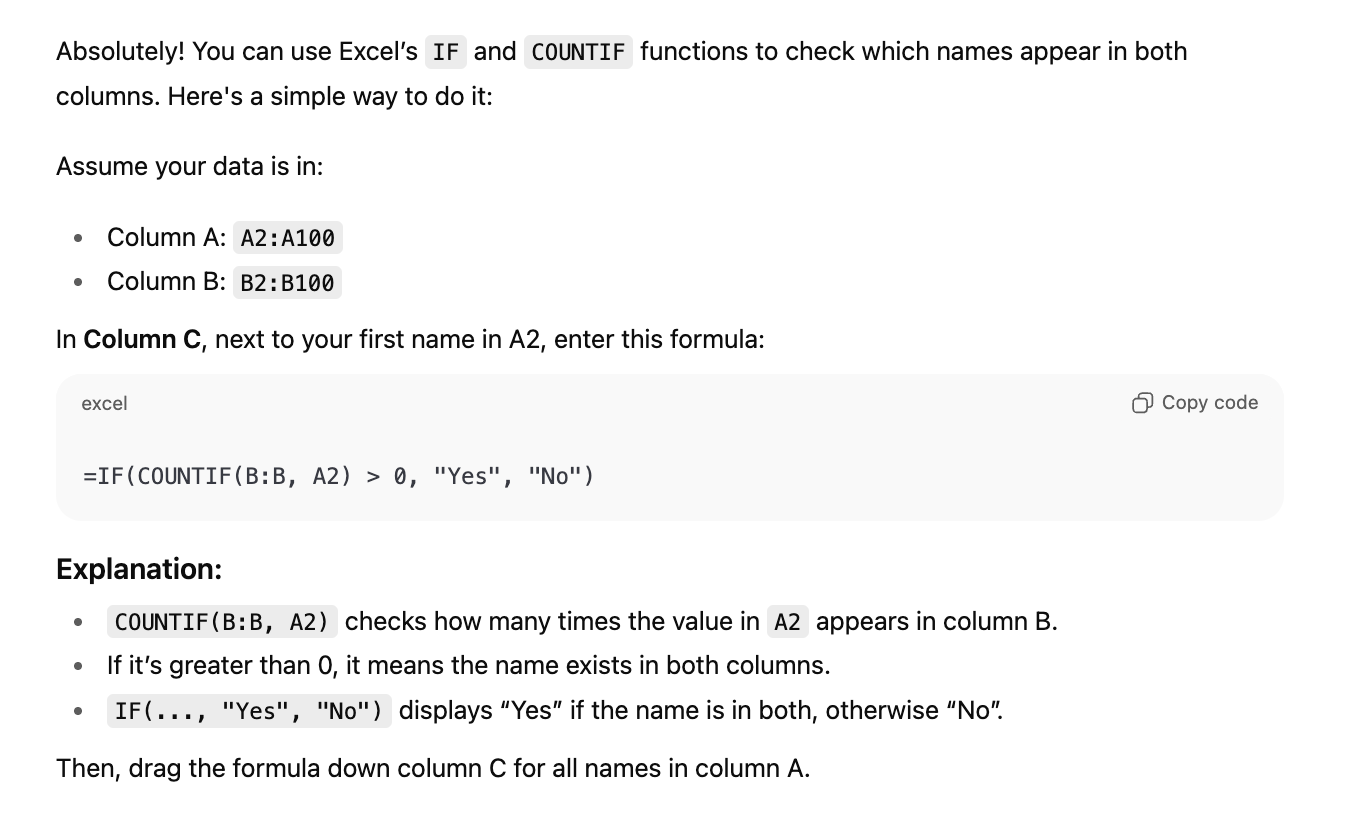
This prompt example can easily be adapted for whatever you’re trying to achieve in Excel. Write a clear outline of the data you have and what you want to do with it, and ChatGPT can create an Excel formula to make the process easier. (If you use Google Sheets or another Excel alternative, swap this into the prompt).
Top tips for using ChatGPT to analyze PPC performance
These prompts are a great starting point, but there are dozens of ways to use ChatGPT for effective PPC analysis. Here are three top tips for refining your ChatGPT prompts to get the best results.
- Include as much detail as possible — While the prompts above are fairly short, the more information you can feed the GPT, the better your output. As Optmyzr’s Fred Vallaeys told us: "A 10,000-word prompt to do code building is not unusual. The better you can describe what it is you want, the better the outcome."
- Restrict the output scope — Tell ChatGPT how you want to receive the output, including scope restrictions and stylistic preferences. For example: “generate the results as a table, and don’t summarize my original input.”
- Use plugins and extensions — Pasting data into ChatGPT can work, but it may be more efficient to use a GPT that plugs directly into your ads data.
For more tips on generating your own prompts and a list of ways to connect ad data to generative AI, watch our ChatGPT for PPC success webinar with Fred Vallaeys.
Maximize your paid media ROI with Lunio
Effective reporting and analysis is essential for maintaining high-performing PPC campaigns. Without this, your campaigns can start to fall behind your competitors’ and stop connecting with your audiences.
But continual analysis and optimization isn’t the only way to maximize campaign efficiency. In fact, even the best-maintained campaigns can be undermined by bots and invalid traffic. Eliminating these is essential, as they drain your ad spend without generating any valuable conversions.
That’s where Lunio comes in. Our traffic verification platform ensures every click comes from a real user — the kind of audience that’s genuinely likely to convert.
Discover how Lunio protects your PPC efforts from invalid traffic and boost conversions with a free 14-day traffic audit.



